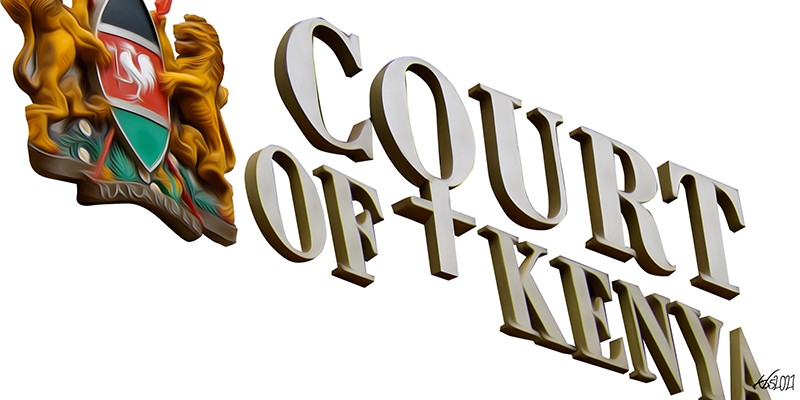On Thursday 22 July 2021, Justice Aggrey Muchelule and Justice Said Juma Chitembwe were subjects of arbitrary search, intimidation, and interrogation by the Directorate of Criminal Investigations (DCI) on the basis of unfounded allegations of corruption.
The arrest, coming in the wake of constant and relentless attacks on the judiciary by the Executive and politicians, left a very sour taste in the mouths of many, bearing in mind that nothing was found to implicate the judges upon searching their respective chambers. Let it be clear that NOBODY is above the law (nemo est supra legis)! Not even the President of the Republic, let alone the judges.
However, there are reasons why there are arguments for special procedures when arresting or dealing with criminal allegations against a sitting judge: the need to preserve the sanctity of the office and the need to manage perceptions with regard to the judicial office. The Supreme Court of India in the case of Delhi Judicial Service Association v. State of Gujarat AIR 1991 SC 2176, (1991) 4 SCC 406 recognized the fact that whereas judges were not above the law, certain guidelines had to be in place to guide the conduct of arrest “in view of the paramount necessity of preserving the independence of judiciary and at the same time ensuring that infractions of law are properly investigated”. The concept of judicial independence, it must be recalled, recognizes not only realities but also perceptions that attach to the judicial office.
Chief Justice Howland in the Canadian Supreme Court case of R v. Valente [1985] 2 SCR 673 stated as follows with regards to perception as an ingredient of judicial independence: “it is most important that the judiciary be independent and be so perceived by the public. The judges must not have cause to fear that they will be prejudiced by their decisions or that the public would reasonably apprehend this to be the case.’ There is therefore the need to guard and jealously so, the image of the judiciary such as to manage how the judiciary is perceived by the public.
The unsubstantiated claims of corruption, and knee jerk searches without an iota of evidence does not bode well for the perception of the judiciary as a whole, and specifically, for the individual judges involved whose reputations are dragged through the mud, and needlessly so. There are germane reasons why the arrest of a judge should not be a trivial matter. The deference and respect to a judicial office informs the caution exercised in the conduct of arresting a judge. The judicial office fuses with the person of the holder and therefore it becomes necessary to err on the side of caution.
Indeed, Courts elsewhere have endeavoured to engage cautiously in this exercise of delicate funambulism. The Supreme Court of India in the case of K. Veeraswami v Union of India and others, 1991 SCR (3) 189 found that a sitting judge can only be undertaken with permission from the Chief Justice or if it is the Chief Justice who is sought to be prosecuted, from the President.
Equally, the Court of Appeal of the Federal Republic of Nigeria in the case of Hon. Justice Hyeladzira Ajiya Nganjiwa V. Federal Republic of Nigeria (2017) LPELR-43391(CA) held that a sitting judge cannot be prosecuted for offences that would have otherwise been a ground for removal from office.
It is important to note that the grounds for the removal of any judge from office are captured in article 168 of the Constitution of Kenya and they include a breach of the code of conduct and gross misconduct or misbehaviour.
Noteworthy it is to remark that the High Court of Kenya, in laying a principle of constitutional law in the case of Philomena Mbete Mwilu v Director of Public Prosecutions & 3 others; Stanley Muluvi Kiima (Interested Party); International Commission of Jurists Kenya Chapter (Amicus Curiae) [2019] eKLR ably stated that, “While the DCI is not precluded from investigating criminal misconduct of judges, there is a specific constitutional and legal framework for dealing with misconduct and/or removal of judges.
Consequently, cases of misconduct with a criminal element committed in the course of official judicial functions, or which are so inextricably connected with the office or status of a judge, shall be referred to the JSC in the first instance.” The cumulative conclusion was that the gang-ho recklessness meted on Justices Muchelule and Chitembwe by an increasingly overzealous Department of Criminal Investigations (DCI) was an affront to judicial independence in its functional sense and also in terms of perception. It was a careless move.
If there is any evidence linking any of the judges to any conduct unbecoming, then out of constitutional edict and commonsensical pragmatism, the first point of call should be the Judicial Service Commission (JSC). The Office of the Chief Justice must also be subject of focus during this unfortunate debacle.
The statement emanating from that office in the aftermath of the unfortunate events of 22nd July 2021, was at best timid and disjointed. The statement did not appear to reinforce the constitutional principle that judges cannot be arrested over matters that really ought to be addressed by the Judicial Service Commission. The office of the Chief Justice should have done better.
In summary, let it be proclaimed boldly that judicial independence is too precious a public good that it will be protected at all costs. Let it be lucid that incessant interference with judicial independence will not be tolerated from any quarters.
Judicial independence is Kenya’s last buffer line, stopping the country from degenerating into absolute tyranny. Judicial independence is a collective national good. It will be protected as such! And in the words of John Rutledge, a scholar, jurist and the second Chief Justice of the United States of America; “So long as we may have an independent Judiciary, the great interests of the people will be safe.”
–
This article was initially published at THE PLATFORM For Law, Justice and Society Magazine








